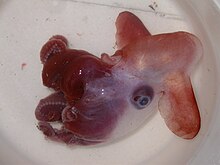
Grimpoteuthis is a genus of pelagic cirrate (finned) octopods known as the dumbo octopuses. The name "dumbo" originates from their resemblance to the title character of Disney's 1941 film Dumbo, having two prominent ear-like fins which extend from the mantle above each eye. There are 17 species recognized in the genus. Prey include crustaceans, bivalves, worms and copepods. The average life span of various Grimpoteuthis species is 3–5 years.

Velodona togata is a species of octopus in the monotypic genus Velodona. First described by Carl Chun in 1915, with a second subspecies discovered by Guy Coburn Robson in 1924, it was named for the distinctive membranes on its arms.
Stauroteuthis gilchristi is a species of small pelagic octopus found at great depths in the south Atlantic Ocean. It is believed to be one of a very small number of octopuses to exhibit bioluminescence, like its sister taxon Stauroteuthis syrtensis.

Grimpoteuthis bathynectes is a deepwater species of Grimpoteuthis (Dumbo) octopus first described in 1990. It is known from 13 specimens.
Cryptoteuthis brevibracchiata, the short-arm flapjack octopod, is a deepwater species of octopod. It is the only species in the monotypic genus Cryptoteuthis one of the cirrate octopuses of the family Grimpoteuthidae, the umbrella octopuses. It is known from a single specimen which was collected in the northeastern Atlantic Ocean. It has characteristics which are shared with two other genera, Opisthoteuthis and Grimpoteuthis, but is sufficiently distinctive from either of these to warrant the erection of a new genus.
Grimpoteuthis abyssicola, commonly known as the red jellyhead, is a species of small deep-sea octopus known from two specimens. The holotype specimen was a female collected on the Lord Howe Rise, between 3154 and 3180 meters depth. A second specimen was collected on the continental slope of south-eastern Australia between 2821 and 2687 m depth.
Grimpoteuthis boylei is a species of octopus known from only ten individuals.
Grimpoteuthis challengeri is a species of large octopus living in the abyssal zone.
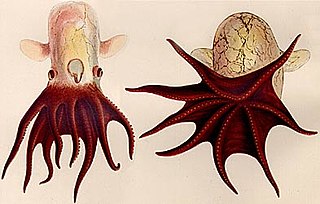
Grimpoteuthis hippocrepium is a species of octopus. It is only known from one specimen found in 1904, which was poorly preserved. Some characteristics G. hippocrepium are unknown.
Grimpoteuthis innominata, commonly known as the small jellyhead, is a species of small, pelagic octopus described by Steve O'Shea in 1999 from two specimens, however several further specimens have since been identified. The genus Enigmateuthis was described to contain this species when described, but Martin Collins placed the species in the genus Grimpoteuthis due to uncertainty regarding the type specimen of Grimpoteuthis.

Grimpoteuthis meangensis is known from either one or two specimens, though the second may be of a completely different species. The first was damaged. Both were found by William Evans Hoyle within one year of each other, and no other animals of the species have been identified since 1886.
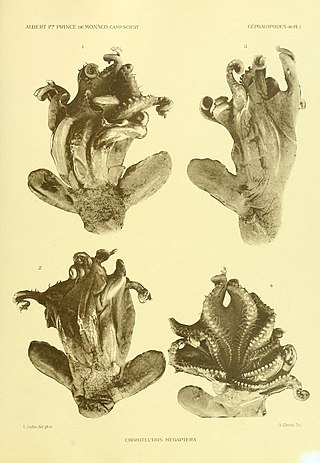
Grimpoteuthis megaptera is a species of octopus known from five specimens, collected by Addison Emery Verrill. Between two and three of these specimens may belong to different species.
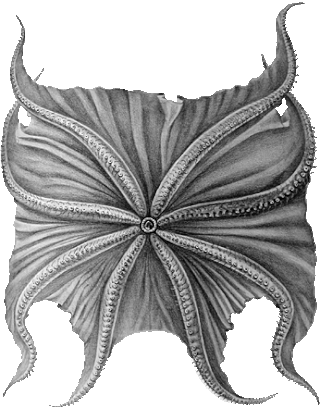
Grimpoteuthis pacifica is an octopus known from one badly damaged specimen. It is not completely described, and it is not easily separated from some other species of octopus. Nothing clearly differentiates G. pacifica from Grimpoteuthis hippocrepium except for its type locality.

Grimpoteuthis plena is known from only one specimen, which cannot be easily separated from other species of Grimpoteuthis in the Atlantic Ocean. The specimen was in poor condition. It's similar to Grimpoteuthis wuelkeri, and may be a junior specimen of Grimpoteuthis umbellata.
Grimpoteuthis tuftsi is an octopus known from seven specimens.

Grimpoteuthis umbellata, known from three specimens, is the type species of Grimpoteuthis.
Grimpoteuthis wuelkeri is a medium-sized octopus characterized from multiple specimens.

Opisthoteuthis agassizii is a lesser-known, deep-sea octopus first described in 1883 by Addison E. Verrill.
Opisthoteuthis bruuni is a species of finned cirrate octopus found along the western coast of South America. Their tissue is almost jelly-like, and they have short, round bodies.
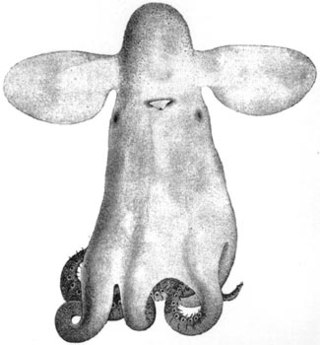
Grimpoteuthidae are a family of bentho-pelagic octopuses, comprising three currently accepted genera. They have extensive arm webbing and relatively large fins allowing for powerful fin swimming.
